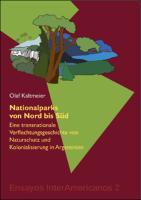Nationalparks von Nord bis Süd
Eine transnationale Verflechtungsgeschichte von Naturschutz und Kolonialisierung in Argentinien
Author(s)
Kaltmeier, Olaf
Contributor(s)
Raussert, Wilfried (editor)
Kaltmeier, Olaf (editor)
Language
GermanAbstract
The first national parks in Latin America were established in Argentina, among them the Nahuel Huapi, the Iguazu Falls or the Perito Moreno Glacier. These natural reserves are established in a transnational entangled space where ideas, imaginations, people, biota and artefacts circulate. The idea of Argentinian national parks has been influenced by various approaches, ranging from the US-American parking policy to the French landscape architecture and the Prussian sustainable forestry to international debates about nature conservation. While national parks are now considered a haven of wilderness, the contemporary interpretation in the first half of the 20th century has been more open. The notion has prevailed in Argentina to perceive national parks as “genuine instruments of colonisation”. Agricultural colonization and displacement of indigenous people, comprehensive programmes for urbanization and touristification of the landscape as well as biological colonisation through salmons, deer, and Douglas firs form an integral part of the Argentinian parking policy. Thus, the connection between nature conservation and colonisation will be examined in this book by asking the following question: How do national parks work?
Keywords
national parks, environmental history, Argentina, Latin America, colonizationDOI
10.4119/unibi/2943025ISBN
9783946507413, 97839466507420Publisher
Kipu-VerlagPublisher website
https://www.uni-bielefeld.de/einrichtungen/cias/publikationen/kipu/Publication date and place
Bielefeld, 2020Series
Ensayos InterAmericanos, 2Classification
History
History of the Americas


 Download
Download